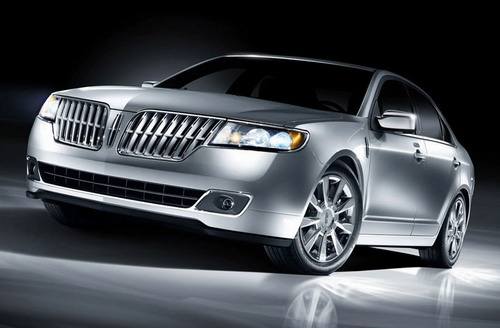
When it comes to fuel efficiency, gas-electric hybrids reward those who drive sensibly and smoothly. Do this, and mileage is high enough to give oil sheiks nightmares. But most midsize hybrids lack a luxury nameplate.
Stepping into this breach is the Lincoln MKZ Hybrid.
Basically, the MKZ uses the same mechanical set-up as the <st
rong>Ford Fusion Hybrid. Like its Ford cousin, the MKZ mates an electric motor to a 2.5-liter, four-cylinder gas engine. The car runs solely on electric power at speeds up to 47 mph, significantly faster than the Toyota Prius.
Above the 47 mph threshold, the MKZ’s four-cylinder gas engine runs in tandem with the electric motor. At highway speeds, only the gas engine runs.
Both the engine and motor shut off when coming to a stop, restarting when the accelerator is pressed.
The electric motor’s battery pack is charged by the gas engine. The battery pack also is recharged by energy captured while decelerating. The car never has to be plugged in. Now, I won’t say that this is a hot-rod Lincoln, since the hybrid system produces a respectable, but hardly fire-breathing, 191 horsepower. That’s sufficient to move this sedan with authority. Sure, there are luxury sedans that are faster; none are more fuel-efficient.
As you would expect in a Lincoln, the driveline switches from electric to gas mode so smoothly that you may not notice the modest rumble from the engine or the slight whine of the electric motor. Power is fed through a continuously variable automatic transmission, which constantly varies the gear ratio for best fuel economy.
This hybrid is free of the lethargic feel of some competing models, with a sprightly feel that belies its frugal ways. Braking is strong, and the pedal has good feel. Like the Fusion, the MKZ benefits from taut handling and a perfectly tuned ride. My grandmother would love its sophisticated, fun-to-drive feel. Body lean is minimal for a family sedan.
Best of all, few cars of any size on sale in the United States get higher mileage.
The EPA rates the MKZ at 41 mpg city, 36 mpg highway. Unlike my time with the Fusion Hybrid, I decided to drive the car without regard for fuel economy. I still managed more than 35 mpg. So it’s possible to be green despite your right foot’s worst intentions.
Now, if you really do want to save the earth’s environment, the instrument cluster helps out. Alongside the traditional mechanical speedometer are digital readouts for fuel economy and power usage – whether gas, electric or both. Other useful readouts include a power drainage gauge, which measures power used by the car’s accessories, and an eco readout.
This last one is actually a diagram of a plant; the more economically you drive, the more the image of the plant grows. If it blooms, you’re golden. Of course, there’s the expected safety technology, such as stability control, traction control and antilock brakes, as well as the unexpected – blind spot detection and cross traffic alert. Those last two are very useful. If a vehicle is in the MKZ’s blind spot or if there’s one crossing behind the Lincoln while backing up, a chime alerts the driver.
Other electronic goodies include Sync, Microsoft’s in-car system for syncing your smart phone or iPod to the car’s own systems. There’s Sirius satellite radio and, more helpfully, Sirius Travel Link, which provides traffic and weather information, including a weather radar map.
All Lincoln MKZ models use genuine wood trim and Bridge of Weir leather. Still, while the interior is nicely designed, it lacks the opulent feel you’d expect. Its luxury seems a bit too understated.
The front bucket seats are comfortably supportive. The rear seat sits a little low, but legroom is good. If you travel and value cargo space, you’ll find the hybrid’s battery pack steals some trunk space compared to the gas-only MKZ. Also, the battery pack prevents the rear seats from folding down for additional storage.
So, what does all of this cost? Compared to its Ford cousin, about $5,500 more. But the Lincoln is a much more handsome automobile, with better materials. So, say you want an MKZ. Both the hybrid model has the same base price as the gas-only model. The difference between the two? Usually, the gas model has some kind of incentive, the hybrid doesn’t.
Still, you may find the Hybrid’s combination of fuel efficiency and comfortable surroundings hard to resist. Certainly, there are few competitors. Just don’t tell any sheiks you friend on Facebook.
2011 LINCOLN MKZ HYBRID:
-What we say: A unique proposition
-Pro: Handsome, frugal and fun
-Con: You can get it as a Ford for less
-Engine: 2.5-liter DOHC four-cylinder
-Motor: 275-volt AC
-Wheelbase: 107.4 inches
-Length: 189.8 inches
-Weight: 3,752 pounds
-Cargo space: 11.8 cubic feet
-EPA rating (city/highway): 41/36 mpg
-Fuel consumption: 35.3 mpg
-Fuel type: Regular
-Base price: $34,440
-As tested: $38,775

